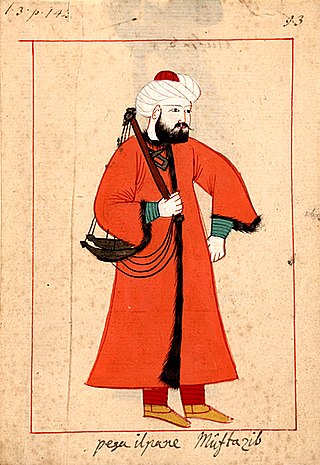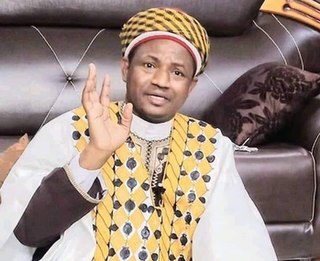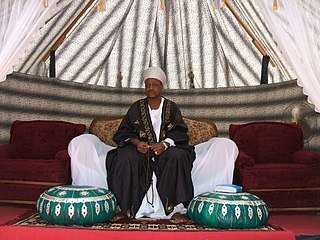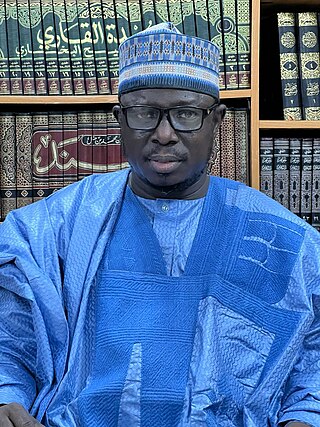Shehu Usman dan Fodio. was a Fulani scholar, Islamic religious teacher, poet, revolutionary and a philosopher who founded the Sokoto Caliphate and ruled as its first caliph.

Islam is one of the two largest religions in Nigeria. Nigeria also has the largest Muslim population in Africa. In 2018, the CIA World Factbook estimated that 53.5% of Nigeria's population is Muslim. Islam is predominantly concentrated in the northern half of the country, with a significant Muslim minority existing in the southern region. Most of Northern Nigeria is governed under Sharia law, while the rest of the country is governed under secular law.

Katsina State is a state in the northwestern geopolitical zone of Nigeria. Katsina State borders the Republic of Niger to the north for 250 km and the States of Jigawa for 164 km and Kano to the east, Kaduna to the south for 161 km and Zamfara to the west. States. Nicknamed the "Home of Hospitality", Both the state capital and the town of Daura have been described as "ancient seats of Islamic culture and learning" in Nigeria.

Religious police are any police force responsible for the enforcement of religious norms and associated religious laws. Nearly all religious police organizations in modern society are Islamic and can be found in countries with a large Muslim populace, such as Saudi Arabia or Iran. The responsibilities of religious police heavily vary by religion and culture. For example, the Islamic religious police prioritize the prevention of alcohol consumption, playing of music, public displays of affection, Western holidays, and prayer time absences. On the other hand, the religious police force in Vietnam are responsible for monitoring religious extremists, such as Dega Protestants or Ha Mon Catholics. As of 2012, at least 17 nations have police that enforce religious norms, according to a new Pew Research analysis of 2012 data. These actions are particularly common in the Middle East and North Africa, where roughly one-third of countries (35%) have police enforcing religious norms. As of 2012, religious police forces were not present in any country in Europe or the Americas.
Enjoining good and forbidding wrong are two important duties imposed by God in Islam as revealed in the Quran and Hadith.

A muḥtasib was "a holder of the office of al-hisbah in classical Islamic administrations", according to Oxford Islamic Studies. Also called ‘amil al-suq or sahib al-suq, the muḥtasib was a supervisor of bazaars and trade, the inspector of public places and behavior in towns in the medieval Islamic countries, appointed by the sultan, imam, or other political authority. His duty was to ensure that public business was conducted in accordance with the law of sharia.

In Nigeria, Sharia has been instituted as a main body of civil and criminal law in twelve Muslim-majority states since 1999, when then-Zamfara State governor Ahmad Sani Yerima began the push for the institution of Sharia at the state level of government. A "declaration of full Sharia law" was made in the twelve states in that year, and the states created Islamic legal institutions such as a Sharia Commission, and Zakat Commission, and a hisbah. According to some critics, the adoption of Sharia law violates Article 10 of the Nigerian constitution guaranteeing religious freedom.
Islamic religious police are official Islamic vice squad police agencies, often in Muslim-majority countries, which enforce religious observance and public morality on behalf of national or regional authorities based on its interpretation of sharīʿah. Modern Islamic religious police forces were first established in the late-1970s amidst the Iranian Revolution (1979) and the Islamic revival that the event brought to the Muslim world; prior, the administration of public morality in most Muslim-majority countries was considered a socio-religious matter, and was enforced through application of civil laws and/or through more informal means.
Ahmed Rufai Sani Yerima is a Nigerian politician who was Governor of Zamfara State from May 1999 to May 2007, and served as Senator for Zamfara West and Deputy Minority Leader in the Senate. He is a member of the All Progressives Congress (APC).
Wilayatul Hisbah is the Islamic religious police force responsible for the enforcement of sharia law in the autonomous region of Aceh, Indonesia. The origins of this force can be traced to 2001 when a special autonomy law was promulgated to allow for the state of Aceh to implement more elements of sharia law, which the Indonesian government see as a useful way of decreasing local fervor for Acehnese independence. These officers have reportedly been patrolling the streets since 2002, but the force was formally established in 2004, It was established at both provincial level as well as the district and municipality levels. The units were formed in response to an increase in "unmarried couples, Muslim women without headscarves or those wearing tight clothes, and people drinking alcohol or gambling,” which authorities perceived to have become more common following contact with Western ideas after foreign aid was provided after the 2004 Indonesian tsunami. It was described in a 2014 report as being a "voluntary" force.
Kala Kato is a Quranist movement whose adherents reside mostly in northern Nigeria, with some adherents residing in Niger. Kala Kato means a "man says" in the Hausa language, in reference to the sayings, or hadiths, posthumously attributed to the Islamic prophet Muhammad. Kala Kato accepts only the Quran as authoritative and believe that anything that is not Kala Allah, which means what "God says" in the Hausa language, is Kala Kato.

Abduljabbar Nasuru Kabara Abduljabbar is a Nigerian controversial Islamic cleric and a Qadiriyya scholar based in Kano, Nigeria, accused of blasphemy towards the Islamic prophet Muhammad. He is the son of Nasuru Kabara, the former leader of the Qadiriyya sect of West Africa and a junior brother to Karibullah Nasir Kabara the successor of their late father.
The 2003 Kano State gubernatorial election occurred on April 19, 2003. All Nigeria Peoples Party (ANPP) candidate Ibrahim Shekarau won the election, defeating People's Democratic Party (PDP) Rabiu Kwankwaso and 5 other candidates.
The 2003 Katsina State gubernatorial election occurred on 19 April 2003. PDP candidate Umaru Musa Yar'Adua won the election, defeating ANPP Nura Khalil and 5 other candidates.
The 2007 Katsina State gubernatorial election occurred on 14 April 2007. PDP candidate Ibrahim Shema won the election, defeating ANPP Abu Ibrahim and other candidates.

Khalifa Sheikh Qaribullah Sheikh Muhammad Nasir Kabara Al-Malikiy, Al-Ash’ariy, Al-Qadiriy is the leader of the Qadriyyah Sufi Movement in Nigeria and the West African region. He became the Khalifa in 1996 after the death of his father, Sheikh Muhammad Nasir Kabara. With adherents stretching from Chad basin to the Senegambia, the Qadriyyah Tariqa is the most focused concentration of Sufi adherents in post-colonial Africa.

Hausa literature is any work written in the Hausa language. It includes poetry, prose, songwriting, music, and drama. Hausa literature includes folk literature, much of which has been transcribed, and provides a means of recording, preserving, and transmitting knowledge, especially in regard to social, psychological, spiritual, or political roles.
Shatu Sani Garko is a Nigerian model and beauty queen who was crowned the 44th Miss Nigeria in 2021. Winning at the age of 18, she is notable for being the first Muslim to win the pageant.

Aminu Ibrahim Daurawa also known with his honorific as Sheikh Daurawa, is a Nigerian Islamic Scholar from Kano state. His father is a famous Researcher called Sheikh Ibrahim Muhammad Mai Tafsiri, Sheikh Daurawa appointed by Kano State governor Abba Kabir Yusuf in 2023 as commander of Hisbah Kano.

Sheikh Kabir Ahmad Azare was a Nigerian Islamic scholar, preacher, and leader of the Council of Ulama' of JIBWIS Katagum Zone. He was a follower of the Sunni school of thought and a prominent member of the Jama'atu Izalatil Bid'ah Wa'Ikamatis Sunnah (JIBWIS) movement. He was known for his vast knowledge of the Quran, Hadith, Fiqh, and Arabic language, as well as his eloquent and captivating lectures.












